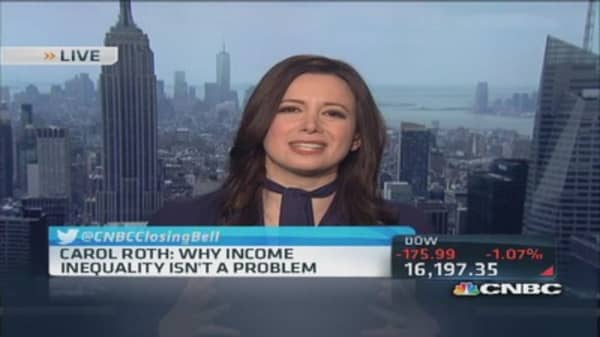However, I take issue with the entire inequality discussion, as opportunity and prosperity are important objectives, but equality is not only a pipe dream, it isn't desirable.
There is no equality. There's an old and true saying that "Life isn't fair." That's a fancy way of saying that life isn't equal. All of us endure circumstances where we have more or less than those around us. We are not equal in our intelligence or our physical appearance. We are not equal in love and relationships. In my life, having lost both my parents, I have a deficit in family, which I would gladly trade some of my income for. Do we adjust for every circumstance where one person has more than another? Should there be an "ab" limit, where those with six pack abs are capped at having three and the rest redistributed to others? Obviously, I am being facetious to show how ridiculous the notion is. People can always find those who have more or less than they have of various attributes of importance. Money is just one currency and while it has a place and an importance, it should not be the be-all-end-all of focus.
(Read more: Why we shouldn't raise the minimum wage)
Additionally, those of us born in the United States have won the genetic lottery. We live in a land of opportunity sought out by immigrants throughout the world. The poor in the United States are substantially better off than many throughout the world, so where does the inequality argument end? Are we obligated to then make everyone in the world equal, since it was a matter of luck that some of us ended up in America instead of Sierra Leone where the GDP per capital is around $374, or The Congo, where GDP per capita is around $271 and more than 70 percent of the population lives in poverty? There is even an index that shows that the bottom 10 percent of those in the U.S. have a better socio-economic status that those in the top 10 percent of countries like Russia, Portugal, Brazil and Mexico.
Focus on the problem, not the side effect. Shifting attention back to America, inequality isn't the problem — the problem is the level of people in and near poverty (as well as the struggles of those in the middle class of late). The fact that some people have significantly more wealth makes this no more of a problem than if those people were less wealthy.
We need more people focused on solving the problem, not treating the side effect, which is a lack of appropriate skills to put to work more people in our changing economic environment. Education and training are musts, and would be musts regardless of the size of the gap between the poorest and the wealthiest.
(Read more: Marco Rubio: Why lower-income workers are stuck)
Wealth creation helps many. There are too many people who somehow believe, despite our history of growth and wealth creation, that somehow there's a fixed amount of wealth and that one person getting a share only leaves so much for someone else. That's blatantly untrue. Innovation and its effect of wealth creation is what helps to grow the economy and creates more wealth which benefits many people. Take for example the young billionaire, Mark Zuckerberg. His becoming wealthy benefitted many. By starting a company, he left open a job that he could have taken elsewhere to be filled by someone else, plus founded a company that created many new jobs — and wealth. His becoming wealthy through Facebook was not at the expense of anyone (Well, other than maybe the Winklevoss Twins…).



